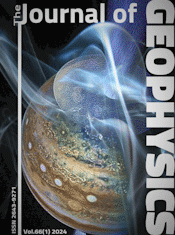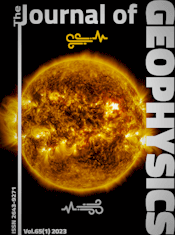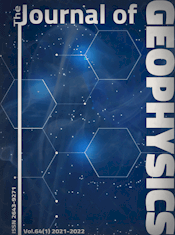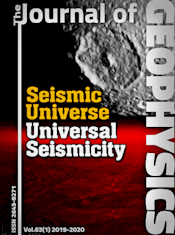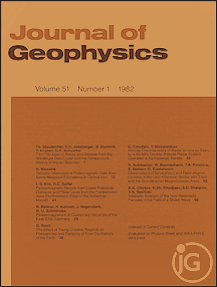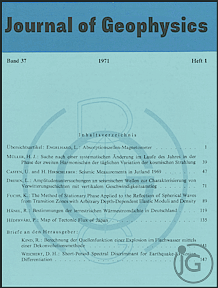Estimate of confidence in paleomagnetic directions derived from mixed remagnetization circle and direct observational data
Article Sidebar
Published:
Dec 15, 1983
Keywords:
Paleomagnetism,
Remagnetization Circles,
Mixed Circle and remanence direction data
Volumes
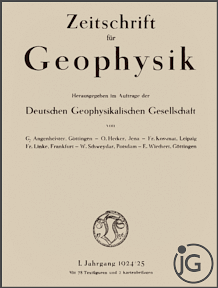
Vols. 1-18 (1924-1944), ISSN 0044-2801
Main Article Content
R.C. Bailey
Department of Geology, University of Toronto, Canada
H.C. Halls
Department of Geology, University of Toronto, Canada
Abstract
A method is presented for obtaining the direction and confidence oval for a paleomagnetic component at a site given a number of independently oriented samples, some of which give an estimate of the remanence direction, while others yield only remagnetization circles. Such mixed remagnetization circle-remanence direction data frequently characterise paleomagnetic sites carrying two remanence components where the component of interest is small and less dispersed compared to a more easily removed one. The method described maximises the amount of usable data per site and thus leads to an improved site direction estimate.
 ARK: https://n2t.net/ark:/88439/y000446
ARK: https://n2t.net/ark:/88439/y000446
Permalink: https://geophysicsjournal.com/article/149
Article Details
How to Cite
Bailey, R., & Halls, H. (1983). Estimate of confidence in paleomagnetic directions derived from mixed remagnetization circle and direct observational data. Journal of Geophysics, 54(1), 174-182. Retrieved from https://journal.geophysicsjournal.com/JofG/article/view/149
Section
References
Bailey, M.E., Hale, C.J. (1981) Anomalous magnetic directions recorded by laboratory induced chemical remanent magnetisation. Nature 294:739-741
Creer, K.M. (1962) A statistical enquiry into the partial remagnetization of folded Old Red sandstone rocks. J. Geophys. Res. 67:1899-1906
Halls, H.C. (1976) A least-squares method to find a remanence direction from converging remagnetization circles. Geophys. J. R. Astron. Soc. 45:297-304
Halls, H.C. (1978) The use of converging remagnetization circles in paleomagnetism. Phys. Earth Planet. Inter. 16:1-11
Halls, H.C. (1979) Separation of multicomponent NRM: combined use of difference and resultant magnetization vectors. Earth Planet. Sci. Lett. 43:303-308
Hoffman, K.A., Day, R. (1978) Separation of multicomponent NRM: a general method. Earth Planet. Sci. Lett. 40:433-438
Jones, D.L., Robertson, I.D.M., McFadden, P.L. (1975) A paleomagnetic study of Precambrian dyke swarms associated with the Great Dyke of Rhodesia. Geol. Soc. S. Afr. 78:57-65
Khramov, A.N. (1958) Paleomagnetism and stratigraphic correlation, Gastoptechizdat (Leningrad, 218 p., transl. Lojkine, A.J.). Geophysics Department, Australian National University, 1960
Khramov, A.N. (1971) Paleomagnetic directions and paleomagnetic poles. McElhinny, M.W. (Ed.) and Brown, D.A. (Transl.). Australian National University, RSES Publ. No. 990, 1973
Kirschvink, J.L. (1980) The least squares line and plane and the analysis of paleomagnetic data. Geophys. J. R. Astron. Soc. 62:699-718
Mardia, K.V., Edwards, R. (1982) Weighted distributions and rotating caps. Biometrika 69:323-330
McFadden, P.L. (1977) Comments on "a least-squares method to find a remmanence direction from converging remagnetization circles" by H.C. Halls. Geophys. J. R. Astron. Soc. 48:549-550
Onstott, T.C. (1980) Application of the Bingham distribution function in paleomagnetic studies. J. Geophys. Res. 85:1500-1510
Palmer, H.C., Halls, H.C., Pesonen, L.J. (1981) Remagnetization in Keweenawan rocks. Part I: Conglomerates. Can. J. Earth Sci. 18:599-618
Ramsay, J.G. (1967) Folding and fracturing in rocks. McGraw-Hill, New York
Watson, G.S. (1960) More significant tests on a sphere. Biometrika 47:87-91
Watson, G.S. (1965) Equatorial distributions on a sphere. Biometrika 52:193-201
Zijderveld, J.D.A. (1967) A.C. demagnetization in rocks: analysis of results. In: Collinson, D.W., Creer, K.M., Runcorn, S.K. (Eds.) Methods in paleomagnetism, 254-286. Elsevier, New York
Creer, K.M. (1962) A statistical enquiry into the partial remagnetization of folded Old Red sandstone rocks. J. Geophys. Res. 67:1899-1906
Halls, H.C. (1976) A least-squares method to find a remanence direction from converging remagnetization circles. Geophys. J. R. Astron. Soc. 45:297-304
Halls, H.C. (1978) The use of converging remagnetization circles in paleomagnetism. Phys. Earth Planet. Inter. 16:1-11
Halls, H.C. (1979) Separation of multicomponent NRM: combined use of difference and resultant magnetization vectors. Earth Planet. Sci. Lett. 43:303-308
Hoffman, K.A., Day, R. (1978) Separation of multicomponent NRM: a general method. Earth Planet. Sci. Lett. 40:433-438
Jones, D.L., Robertson, I.D.M., McFadden, P.L. (1975) A paleomagnetic study of Precambrian dyke swarms associated with the Great Dyke of Rhodesia. Geol. Soc. S. Afr. 78:57-65
Khramov, A.N. (1958) Paleomagnetism and stratigraphic correlation, Gastoptechizdat (Leningrad, 218 p., transl. Lojkine, A.J.). Geophysics Department, Australian National University, 1960
Khramov, A.N. (1971) Paleomagnetic directions and paleomagnetic poles. McElhinny, M.W. (Ed.) and Brown, D.A. (Transl.). Australian National University, RSES Publ. No. 990, 1973
Kirschvink, J.L. (1980) The least squares line and plane and the analysis of paleomagnetic data. Geophys. J. R. Astron. Soc. 62:699-718
Mardia, K.V., Edwards, R. (1982) Weighted distributions and rotating caps. Biometrika 69:323-330
McFadden, P.L. (1977) Comments on "a least-squares method to find a remmanence direction from converging remagnetization circles" by H.C. Halls. Geophys. J. R. Astron. Soc. 48:549-550
Onstott, T.C. (1980) Application of the Bingham distribution function in paleomagnetic studies. J. Geophys. Res. 85:1500-1510
Palmer, H.C., Halls, H.C., Pesonen, L.J. (1981) Remagnetization in Keweenawan rocks. Part I: Conglomerates. Can. J. Earth Sci. 18:599-618
Ramsay, J.G. (1967) Folding and fracturing in rocks. McGraw-Hill, New York
Watson, G.S. (1960) More significant tests on a sphere. Biometrika 47:87-91
Watson, G.S. (1965) Equatorial distributions on a sphere. Biometrika 52:193-201
Zijderveld, J.D.A. (1967) A.C. demagnetization in rocks: analysis of results. In: Collinson, D.W., Creer, K.M., Runcorn, S.K. (Eds.) Methods in paleomagnetism, 254-286. Elsevier, New York



